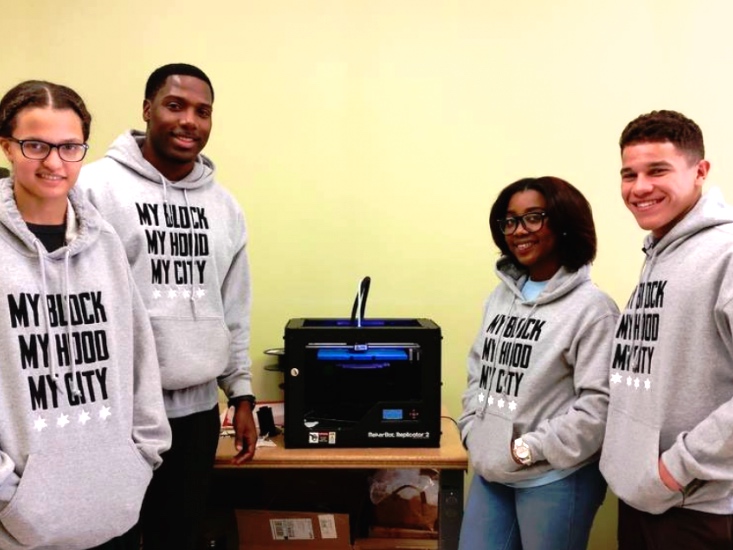
In the ongoing series “From the Ground Up,” Occupy.com joins Commonomics USA presenting stories about local efforts to create a new sustainable economy.
In the summer of 2015, in Chicago’s West Side Austin neighborhood, Barry Koren helped bring together a group of kids wanting tennis lessons with skilled instructors able to teach them. Koren’s Our Village Life project partnered with Circle Urban Ministries to facilitate the exchange for 14 children in the economically-challenged area.
But instead of paying hundreds of dollars for lessons, each parent or guardian paid two hours of time – 28 hours total – to three qualified tennis coaches. The results of this small time exchange are featured in this video.
A year later, I’m talking to Koren about time exchange and his particular variant on it. Our Village Life’s exchange system lets people purchase and trade goods and services for time as well as money. Koren founded Our Village Life to create opportunities for connection, community and material support in Chicago neighborhoods. Time exchange is a crucial component of the project.
The concept of time banking is not new. A number of socialists practiced it in the 19th century, sometimes creating notes to reflect the currency value of the exchange. Time banking experiments continue today all over the world.
Speaking of time, meeting Barry Koren was timely and topical. Our conversation occurred against a backdrop of unstable global currencies, declining wages, sections of the country (and the world) that have missed out on the economic recovery, the threat of new trade deals that could depress and privatize even more chunks of the world, and a political system where progressives are up against incredible odds with little money to spend on restorative political action. Amidst all that urgency, a semi-philosophical discussion about time was almost meditative.

Stop, Breathe, and Think About What Humans with Good Intent Can Do.
An architect and urban planner who wrote his PhD dissertation on race and neighborhoods, Koren had come to Chicago to work at a social service agency and search for a way to solve the area's housing crisis. What struck him was that there were so many precious resources wasted and problems not solved. Money – and its absence – got in the way of everything. He developed the idea of an alternative currency, and his focus eventually turned to time.
Koren and other proponents believe that time-as-exchange is less materially extractive and more spiritually authentic than the currency-and-interest model of finance. In the current system, dollars are issued by central banks, put into circulation through loans by private banks, and those loans are paid back in principle plus interest. But the interest isn’t put into circulation in the same manner as the principle. Interest is created through the additional extraction of labor, natural resources, other people’s money and stuff.
This is part of the reason for the “growth imperative,” says Koren, and we don’t always see the effects of this in our day-to-day interactions. “Scarcity is like musical chairs," he says. "When there are a lot of chairs, you don't notice who gets bumped out.”
In time exchange, service hours can be exchanged for other service hours, or for goods; goods can be similarly exchanged. Not having the cash to purchase an item isn’t a deal-breaker if you can spare the hours. Although the systems would need to increase in scale and diversity to yield benefits to those of us who have neither money nor time (full-time minimum wage workers, for example), various “pay-it-forward” arrangements provide ways for both dollars and hours to generate value beyond their initial investment.
Time exchange offers a more autonomous and interpersonal way of circulating value, where, instead of extracting monetary interest, we share a more intimate resource: “The time we have left on this earth,” as Koren puts it. A unit of time is more intimate than a dollar, but it’s also easier to offer such an exchange when one is unemployed or broke. Building larger systems of time exchange would allow communities of people who have skills and labor power, but not dollars, to generate value through their mutual labor.
Informally, “rich people frequently use time exchange,” Koren says, but its more significant potential lies in creating systems of such exchange to benefit those who don’t have easy access to currency and capital.

If Koren is Right, the Potential is Enormous.
Time exchange systems could be a way for communities to survive and develop economic autonomy, and for people to participate in an exchange system that builds mutual understanding as it creates sustainable value streams. And that’s not all. Koren also suggested that progressive political organizations in lack of resources could use time exchange.
The potential to fund political action through time exchange intrigued me. A few weeks ago, for a story I wrote about the progressive alliances forming around the 2016 election, I interviewed Jennifer Nix of the ModNomad Studio collective and asked her what the progressive political revolution needed to succeed. Among her long list, she said, “funding.” Research, advocacy and direct action need funding because the people who make it happen have to eat – and as most of us know, progressives are up against extremely well-funded corporate lobbyists.
Koren suggests that some volunteer participants could be paid in time currency, creating systems where they are gaining actual value for their work. This would not be a scheme to extract free labor from interns (as nonprofits are often accused of doing), but a real system for paying people who wouldn’t otherwise be paid.
Although the scale and specifications of that kind of payment system were beyond the scope of our conversation, I noted the potential of groups which are dedicated to building a new economy using new economic techniques for some of their operations. “Dollars are not very good for caring,” Koren reminds me, “whereas hours or spending time naturally supports it.”

These Are Ideas Worth Deep Examination and Scaled Experimentation – With Our Eyes Wide Open to the Results.
There is something significant in the way that time generates a “different kind of interest” emphasizing relationships and personal needs that can connect us to a new economy based more on empathy and less on exploitation. The ultimate test of such experiments will be whether they can meet people’s basic needs. And if such models are successful, elites will push back against them. Then we’ll know we're on to something.
Readers interested in Koren’s project should visit Our Village Life, and you can even join the exchange. As we continue to seek ways to bypass Wall Street and create not just a “new economy,” but networks of local, sustainable and just economies, time exchange is an idea whose time has come.
Matt Stannard is policy director at Commonomics USA.
3 WAYS TO SHOW YOUR SUPPORT
- Log in to post comments













Comments
Ira Dember replied on
Time as currency
The oldest and largest time-exchange currency, Ithaca Hours, celebrates its 25th anniversary in November 2016.
gopal das replied on
Happy New Year 2017
This is a really very nice article. Thanks a lot for sharing this post. To read more
http://www.newyearimages2016.com/